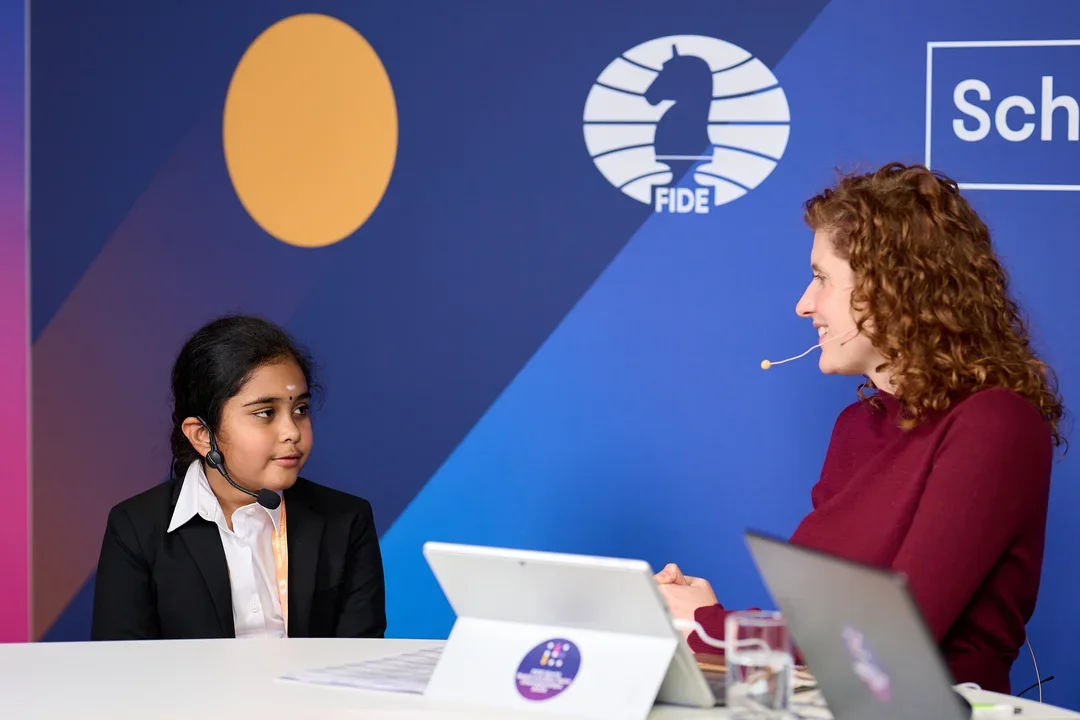Update, August 18, 2025: This article has been updated to reflect the circumstances of GM Bryan Smith’s record-breaking loss. An earlier version of the annotations for this article incorrectly suggested Smith was sitting at the board when he lost on time.
Since then, Smith has reached out to explain that he, in fact, was unaware of the time control for the event, and was away from the board when his flag fell. He has requested this article be updated to reflect this fact, as the original article, based on a good faith reporting of the game with the information that was available at the time, stated that his loss was a result of time trouble. His account of the circumstances surrounding the loss can be found at the end of the updated annotations, embedded below.
For over a decade, IM Carissa Yip held the world record as the youngest girl to beat a grandmaster in a FIDE-rated classical game of chess, at the age of 10 years, 11 months, and 20 days. Almost 11 years later, two players have broken Yip’s record — one in England; the other in the U.S. — only a day apart.
England’s WFM Bodhana Sivanandan, has received plenty of coverage since becoming the youngest member of any national team in last year’s FIDE Olympiad. On Saturday, Aug. 9, she defeated GM Peter Wells in the final round of the 2025 British Chess Championships, clocking in at only 10 years, five months, and three days old. She also became eligible for the WIM title with her 5/9 score.

On Sunday, Aug. 10, Ohio’s Keya Jha defeated GM Bryan Smith in the final round of the 2025 Joe Yun Memorial in Akron, Ohio, to win the tournament with a 4½/5 score at the age of 10 years, nine months, and two days.

While roughly four months older than Sivanandan, Jha was still more than two months ahead of Yip's record, making her the youngest American girl to beat a grandmaster in a FIDE-rated game. Jha also picked up 76 US Chess rating points to reach a personal best of 2179, only 21 points away from the national master title.
Both victories are annotated below. As is often the case with young talent, neither game was smooth. Sivanandan was in tactical danger at several points throughout the game, including at the very end. But the clock is a factor. Sivanandan was able to pose just enough questions to put Wells under tremendous time pressure. Rather than only look at the computer’s evaluations, remember that grandmasters do not get into such time trouble unless they have faced remarkable pushback.
The clock was also a factor in Smith's loss, albeit for different reasons: Jha had a difficult position to defend in a slower, more maneuvering game, with Smith on the precipice of breaking through before losing on time due to mistakenly believing there would be bonus time added after move 40.
Categories
Archives
- January 2026 (8)
- December 2025 (27)
- November 2025 (29)
- October 2025 (39)
- September 2025 (27)
- August 2025 (29)
- July 2025 (43)
- June 2025 (25)
- May 2025 (24)
- April 2025 (29)
- March 2025 (29)
- February 2025 (20)
- January 2025 (24)
- December 2024 (34)
- November 2024 (18)
- October 2024 (35)
- September 2024 (23)
- August 2024 (27)
- July 2024 (44)
- June 2024 (27)
- May 2024 (31)
- April 2024 (51)
- March 2024 (34)
- February 2024 (25)
- January 2024 (26)
- December 2023 (29)
- November 2023 (26)
- October 2023 (37)
- September 2023 (27)
- August 2023 (37)
- July 2023 (47)
- June 2023 (33)
- May 2023 (37)
- April 2023 (45)
- March 2023 (37)
- February 2023 (28)
- January 2023 (31)
- December 2022 (23)
- November 2022 (32)
- October 2022 (31)
- September 2022 (19)
- August 2022 (39)
- July 2022 (32)
- June 2022 (35)
- May 2022 (21)
- April 2022 (31)
- March 2022 (33)
- February 2022 (21)
- January 2022 (27)
- December 2021 (36)
- November 2021 (34)
- October 2021 (25)
- September 2021 (25)
- August 2021 (41)
- July 2021 (36)
- June 2021 (29)
- May 2021 (29)
- April 2021 (31)
- March 2021 (33)
- February 2021 (28)
- January 2021 (29)
- December 2020 (38)
- November 2020 (40)
- October 2020 (41)
- September 2020 (35)
- August 2020 (38)
- July 2020 (36)
- June 2020 (46)
- May 2020 (42)
- April 2020 (37)
- March 2020 (60)
- February 2020 (38)
- January 2020 (45)
- December 2019 (34)
- November 2019 (35)
- October 2019 (42)
- September 2019 (45)
- August 2019 (56)
- July 2019 (44)
- June 2019 (35)
- May 2019 (40)
- April 2019 (48)
- March 2019 (61)
- February 2019 (39)
- January 2019 (30)
- December 2018 (29)
- November 2018 (51)
- October 2018 (45)
- September 2018 (29)
- August 2018 (49)
- July 2018 (35)
- June 2018 (31)
- May 2018 (39)
- April 2018 (31)
- March 2018 (26)
- February 2018 (33)
- January 2018 (30)
- December 2017 (26)
- November 2017 (24)
- October 2017 (30)
- September 2017 (30)
- August 2017 (31)
- July 2017 (28)
- June 2017 (32)
- May 2017 (26)
- April 2017 (37)
- March 2017 (28)
- February 2017 (30)
- January 2017 (27)
- December 2016 (29)
- November 2016 (24)
- October 2016 (32)
- September 2016 (31)
- August 2016 (27)
- July 2016 (24)
- June 2016 (26)
- May 2016 (19)
- April 2016 (30)
- March 2016 (36)
- February 2016 (28)
- January 2016 (32)
- December 2015 (26)
- November 2015 (23)
- October 2015 (16)
- September 2015 (28)
- August 2015 (28)
- July 2015 (6)
- June 2015 (1)
- May 2015 (2)
- April 2015 (1)
- February 2015 (3)
- January 2015 (1)
- December 2014 (1)
- July 2010 (1)
- October 1991 (1)
- August 1989 (1)
- January 1988 (1)
- December 1983 (1)







